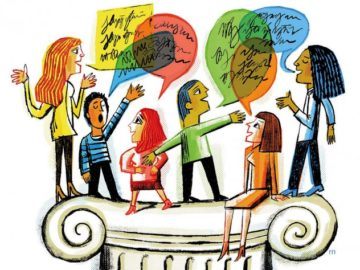Doris Sommer in Harvard Magazine:
 THE DAY BEFORE she cast two tiebreaker votes in the Senate in early February, Vice President Kamala Harris brought chocolates for senators on both sides of the aisle and then huddled with a few senior members around a fire in her office. The gestures were no doubt strategic, given her determination to support progressive decisions, but they also conjure references to another period of social gatherings hosted by elegant women. It was during the Enlightenment, when such gatherings in private salons outside the royal palaces softened the absolutist culture of European monarchies.
THE DAY BEFORE she cast two tiebreaker votes in the Senate in early February, Vice President Kamala Harris brought chocolates for senators on both sides of the aisle and then huddled with a few senior members around a fire in her office. The gestures were no doubt strategic, given her determination to support progressive decisions, but they also conjure references to another period of social gatherings hosted by elegant women. It was during the Enlightenment, when such gatherings in private salons outside the royal palaces softened the absolutist culture of European monarchies.
From the seventeenth century on, spirited conversation in salons became a favorite pastime for educated noblemen and a burgeoning class of professionals, sundry guests who could exercise the wit and curiosity that they acquired through humanistic education. In the welcoming atmosphere of private homes, where hostesses presided with social grace to stimulate lively but not contentious conversation, gentlemen got together with businessmen, military leaders, diplomats, poets, and philosophers to talk about a range of topics that often had no apparent practical or moral value. Disinterested sparring made social equality thinkable. Diverse guests recognized one another as worthy interlocutors. Conversation across class differences depended on talking about fascinating things that didn’t rely on privilege or expertise. They talked about beauty, for example, precisely because it has no established criteria and depends on personal, subjective, responses that people want to share in inter-subjective judgments, to take Immanuel Kant’s line of thinking. When conversations veered toward interests in politics and economics, an alert hostess would tactfully steer the speakers back to the safer space of exciting but uncontentious sparring about the arts.
Aesthetics is the name of this egalitarian activity, a social venture that follows from being surprised by something beautiful, or even something ugly. The surprise is visceral and stays subjective, but the experience—when we think and talk about it—is social. Extended engagement with beauty or the sublime has no practical purpose beyond the pleasure of engaging. This shared pause from pursuits is an obvious and available antidote to the crush of self-interested calculation and competition.
More here.
